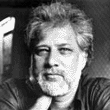
On Monday, I spent a frustrating day seeing a number of professional people to sort some things out for me. While waiting in a series of anterooms of various levels of noisiness, I tried to read
In the Skin of a Lion by Michael Ondaatje (whose name I'd never actually said out loud until last week when I tried to thank a colleague for putting it in the lending library. I could see the word in my head but couldn't get it out. What is it about non-Anglo double vowels and j's in odd places? I can't say JM Cootzee either).
I was about to give up on it until I got home and had a bit of peace and quiet. This is when I realised there was nothing wrong with me: I really DID need to read each paragraph a couple of times to work out what was going on. Each sentence is loaded with meaning and there are very few words to spare. I'm wondering if this is what reviewers mean when they say "muscular prose" which had always struck me as a stupid macho comment. Maybe "sinewy" would be better? It's not surprising that he writes poetry as well. It's certainly a huge contrast to the style of Mr Eugenides.
The dedication page reveals that the title comes from the
Epic of Gilgamesh, which is the world's oldest known epic poem (from Mesopotamia) and the one of the best things I came across in first year at uni. I mean, those Sumerians wrote on little clay tablets and most of these things seemed to be shopping lists or account books. Finding an epic poem there - even one which didn't have completely well-rounded characters? Most unexpected and a surprisingly good read. If you haven't come across it (and it's easy to find in a Penguin Classics edtion), Gilgamesh was a king who had this best friend called Enkidu who died and Gilgamesh was quite sad and wandered round for a long time in the skin of a lion singing songs about him and grieving. I guess we're meant to think that's what the central character in this book is doing too when important people leave his life. Grief certainly makes him do some extreme things (which are really inventive).
The other dedication says something like "no longer will we be able to say the greatest story ever told is the only one". This is another clue because the book is about the people who did the jobs that built Canada. There are some amazing images there. In the first section, immigrant timber workers chop trees in the depths of winter. When rivers have thawed in Spring, the logs are floated downstream and literal logjams are fixed with dynamite. I mean !!?!?! In the central part, workers are building a huge and recordbreaking viaduct over a vast gorge between different parts of Toronto. There's a lot of stuff about a daredevil fearlessly clambering above and below it on ropes. In the final part, they're working on an epic water treatment plant that seems to be the grandest thing in Canada even during the Depression. It requires digging a tunnel into the middle of the lake to get clean water for the inlet pipe. Hard work. Dirty, smelly, horrible, badly paid work.
So partly an expose of how the great engineering achievements of Canada exploited the working classes, partly unhappy love stories. I wasn't convinced by the lovey-dovey stuff in the
English Patient (book and movie) and I don't think these parts of this book are entirely successful either. But reading it was a slightly magical experience. And I'm a sucker for anyone who mentions Gilgamesh.








